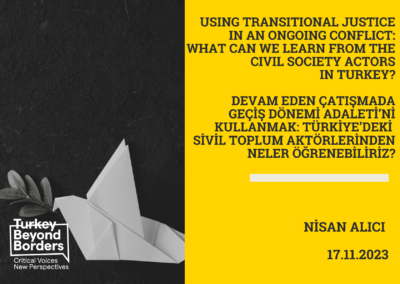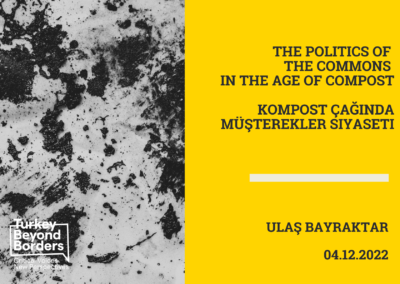Dr. Özgür Sevgi Göral
- Title: Struggle for Reconciliation with the Past in Turkey: Breaking the Pact of Public Secrets (Part 2)
- Başlık: Türkiye’de Geçmişle Hesaplaşma Mücadelesi: Kamusal Sırlar Sözleşmesini Bozmak (Bölüm 2)
- Date/Tarih: 23 Mar/Mart 2022
Recommended Readings / Önerilen Okumalar
- Adorno, Theodor W. Yeni Sağ Radikalizmin Veçheleri ve Geçmişin İşlenmesi Ne Demektir. Istanbul: Metis, 2020.
-
Ahıska, Meltem. “Counter-Movement, Space and Politics: How the Saturday Mothers of Turkey Make Enforced Disappearances Visible.” In Space and the Memories of Violence. Landscapes of Erasure, Disappearance and Exception, ed. Estela Schindel and Pamelo Colombo, 162-175. New York: Palgrave Macmillan, 2014.
-
Akçam, Taner. The Young Turks’ Crime against Humanity: The Armenian Genocide and Ethnic Cleansing in the Ottoman Empire. Princeton: Princeton University Press, 2012.
-
Améry, Jean. At the Mind’s Limits: Contemplations by a Survivor on Auschwitz and Its Realities. Bloomington: Indiana University Press, 2009.
-
Arendt, Hannah. Eichmann in Jerusalem. A Report on the Banality of Evil. New York: Penguin Books, 1963.
-
Avelar, Idelbar. Letter of Violence. Essays on Narrative, Ethics and Politics. New York: Palgrave Macmillan, 2004.
-
Bargu, Banu, ed. Turkey’s Necropolitical Laboratory. Democracy, Violence and Resistance. Edinburgh: Edinburgh University Press, 2019.
-
Bloxham, Donald. The Great Game of Genocide: Imperialism, Nationalism, and the Destruction of the Ottoman Armenians. Oxford: Oxford University Press, 2005.
-
Browning, Christopher R. Ordinary Men: Reserve Police Battalion 101 and the Final Solution in Poland. New York: Harper Collins, 1992.
-
Çelik, Adnan. “ ‘Keep your mouth shut in the day and your door shut at night.’ Intra-Kurdish Violence in the Shadow of the State: The Case of Hizbullah in Kurdistan of Turkey.” Kurdish Studies 9, no. 1 (2022): 37 – 57.
-
Eng, David L. and David Kazanjian, ed. Loss: The Politics of Mourning. Berkeley: University of California Press, 2003.
-
Felman, Shoshana. The Juridical Unconscious. Trials and Traumas in the Twentieth Century. Cambridge, Massachusetts and London: Harvard University Press, 2002.
-
Gatti, Gabriel. “An Orderly Landscape of Remnants: Notes for Reflecting on the Spatiality of the Disappeared.” In Space and the Memories of Violence. Landscapes of Erasure, Disappearance and Exception, ed. Estela Schindel and Pamela Colombo, 176-187. New York: Palgrave Macmillan, 2014.
-
Gordon, F. Avery. Ghostly Matters. Haunting and the Sociological Imagination. Minneapolis and London: University of Minneapolis Press, 2008.
-
Göral, Özgür Sevgi, Ayhan Işık and Özlem Kaya. Unspoken Truth: Enforced Disappearances. Istanbul: Hafıza Merkezi, 2013.
-
Göral, Özgür Sevgi. Any Hopes for Truth? A Comparative Analysis of Enforced Disappearances and the Missing in Middle East, North Africa and Caucasus. Istanbul: Hafıza Merkezi, 2019.
-
Göral, Özgür Sevgi. “Waiting for the disappeared: waiting as a form of resilience and limits of the legal space in Turkey.” Social Anthropology 29, no. 3 (2021): 800-815.
-
Halbwachs, Maurice. On Collective Memory. Chicago and London: The University of Chicago Press, 1992.
-
House, Jim and Neil Macmaster. Paris 1961. Algerians, State Terror, and Memory. New York: Oxford University Press, 2006.
-
Kaya, Özlem and Hatice Bozkurt. Holding up the Photograph. Experiences of the Women Whose Husbands were Forcibly Disappeared. Istanbul: Hafıza Merkezi, 2014.
-
Kurt, Ümit. Antep 1915. Soykırım ve Failler. İstanbul: İletişim, 2018.
-
Levi, Primo. If this is a man/The truce. London: Abacus, 1987.
-
Levi, Primo. The Drowned and The Saved. New York: Simon Schuster, 2017.
-
Mamdani, Mahmood. Beyond Nuremberg: The Historical Significance of the Post-Apartheid Transition in South Africa. Makerere Institute of Social Research, Working Paper, no. 23, 2015.
-
Mbembe, Achille. “Necropolitics.” Public Culture 15, no. 1 (2003): 11–40.
-
Neiman, Susan. Learning from the Germans: Race and the Memory of Evil. New York: Farrar, Straus and Giroux, 2019.
-
Nichanian, Marc. Edebiyat ve Felaket. Istanbul: İletişim, 2011.
-
Rothberg, Michael. Multidirectional Memory. Remembering the Holocaust in the Age of Decolonization. Stanford: Stanford University Press, 2009.
-
Rousso, Henry. Face au Passé. Paris: Belin, 2016.
-
Sarlo, Beatriz. Geçmiş Zaman. Bellek Kültürü ve Özneye Dönüş Üzerine Bir Tartışma. Istanbul: Metis, 2012.
-
Sezer, Devrim. “Soykırım, geçmişle yüzleşme, sorumluluk: Raphael Lemkin, Karl Jaspers, Hannah Arendt.” Toplum ve Bilim, no. 132 (2015): 7-32.
-
Stoler, Ann Laura. Duress: Imperial durabilities for our times. London: Duke University Press, 2016.
-
Taylor, Diana. The Archive and the Repertoire: Performing Cultural Memory in the Americas. Durham, NC: Duke University Press, 2003.
-
Trouillot, Michel-Rolph. Silencing the Past. Power and the Production of History. Boston: Beacon, 1995.
-
Weld, Kirsten. Paper Cadavers. The Archives of Dictatorship in Guatemala. Durham and London: Duke University Press, 2014.
-
Wieviorka, Annette. The Era of the Witness. Ithaca and London: Cornell Uni




